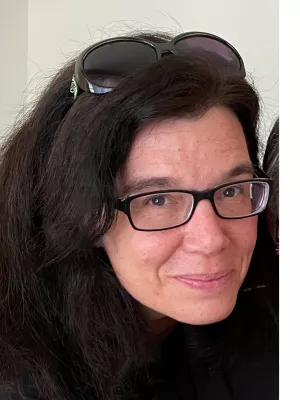
Christine Wamsler
Professor, Docent, appointed Excellent Teaching Practitioner (ETP)

My Malmö – Climate Visions for Transforming the Future : Policy report by LUCSUS and Malmö City
Author
Summary, in English
Sweden and Malmö are widely considered forerunners of climate change mitigation and adaptation, both internationally and by self-proclamation. Political will, available resources, and public knowledge are fairly high. National and local policies and regulations are in place, and a dominant majority of Swedes is well informed about climate change and the associated obligations, seeing climate change as real and a risk for themselves and others in Sweden (Blennow & Persson, 2009).
Despite this situation, progress remains slow, as for all advanced industrialised economies (IPCC, 2018). According to the World Wide Fund for Nature Living Planet Report (WWF, 2016; 2020) Swedes are living a lifestyle that would require the equivalent of around 4.2 Earths to sustain, which places Sweden close to the likes of the United States when it comes to its consumption footprint.
The failure in current approaches to address climate change relates to the fact that they have mainly focused on external factors, such as wider socio-economic structures, governance dynamics and technology. Hardly any efforts have been concerned with the personal, inner drivers of change (Wamsler, 2020). This is unfortunate, as people’s mindsets lie at the root of sustainability challenges and are thus fundamental to the solutions. They involve people’s beliefs, values, worldviews and associated inner qualities or capacities, which can be both forces of change or reproduce current unsustainable paradigms. New approaches are urgently needed.
Despite this situation, progress remains slow, as for all advanced industrialised economies (IPCC, 2018). According to the World Wide Fund for Nature Living Planet Report (WWF, 2016; 2020) Swedes are living a lifestyle that would require the equivalent of around 4.2 Earths to sustain, which places Sweden close to the likes of the United States when it comes to its consumption footprint.
The failure in current approaches to address climate change relates to the fact that they have mainly focused on external factors, such as wider socio-economic structures, governance dynamics and technology. Hardly any efforts have been concerned with the personal, inner drivers of change (Wamsler, 2020). This is unfortunate, as people’s mindsets lie at the root of sustainability challenges and are thus fundamental to the solutions. They involve people’s beliefs, values, worldviews and associated inner qualities or capacities, which can be both forces of change or reproduce current unsustainable paradigms. New approaches are urgently needed.
Department/s
- LUCSUS (Lund University Centre for Sustainability Studies)
- The International Institute for Industrial Environmental Economics
Publishing year
2021
Language
English
Document type
Report
Publisher
Lund University Centre for Sustainability Studies (LUCSUS)
Topic
- Social Sciences Interdisciplinary
Keywords
- climate governance
- Inner transformation
- Inner transition
- Paradigms
- Participation
- political agency
- sustainability transitions
- Worldviews
Status
Inpress